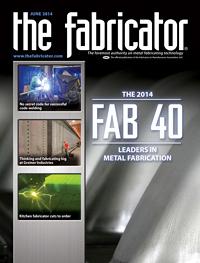Senior Editor
- FMA
- The Fabricator
- FABTECH
- Canadian Metalworking
Categories
- Additive Manufacturing
- Aluminum Welding
- Arc Welding
- Assembly and Joining
- Automation and Robotics
- Bending and Forming
- Consumables
- Cutting and Weld Prep
- Electric Vehicles
- En Español
- Finishing
- Hydroforming
- Laser Cutting
- Laser Welding
- Machining
- Manufacturing Software
- Materials Handling
- Metals/Materials
- Oxyfuel Cutting
- Plasma Cutting
- Power Tools
- Punching and Other Holemaking
- Roll Forming
- Safety
- Sawing
- Shearing
- Shop Management
- Testing and Measuring
- Tube and Pipe Fabrication
- Tube and Pipe Production
- Waterjet Cutting
Industry Directory
Webcasts
Podcasts
FAB 40
Advertise
Subscribe
Account Login
Search
FAB 40: Merrill Fabricators’ welding school fuels local talent base
- By Tim Heston
- June 19, 2014
- Article
- Arc Welding
On several afternoons during the past year, business leaders from north-central Michigan entered a room at Merrill Fabricators—No. 12 on this year’s FAB 40—with people sitting at desks—trained welders, eager and ready to work. These reverse job fairs are hosted by the Merrill Institute, a division of the Alma, Mich.-based company launched in 2011 to fill its need to train and sustain a quality welding workforce. The division has evolved into what is essentially a fabricator-owned welding school.
The organization is American Welding Society-accredited in Schools Excelling Through National Skill Standards Education (SENSE). It’s also an accredited test facility (ATF) that can be used for welder qualification. During the past year the school has become accredited by the state of Michigan, meaning that it can sell its services to outside parties, including welders working for customers and other fab shops in the area.
After two years of accreditation, the school will be able to accept applicants with financial aid, but for now the institute is using government grants to teach a fair number of displaced workers. “These people have been displaced because of unemployment, or they may be military veterans,” said Richard Kobman, general manager.
The most recent graduating class had about two dozen participants trained in all wire processes as well as stick, TIG, and plasma cutting. About 40 welders have graduated from the institute so far, and about half of those have been hired by Merrill. The remaining go on to work at other area product-line manufacturers and fabricators. “The placement rate is well above 85 percent,” Kobman said.
This is a marriage between a welding school and a fabrication company. Steps away from Merrill Institute’s welding lab, students can witness high-end welding and (especially) cladding operations. To meet increased demand from the oil and gas sector, the company recently installed a hot-wire TIG machine from Arc Specialties. Complementing this is a Messer 5-axis plasma table with a triple oxyfuel torch setup to automate the production of K bevels without flipping the plate.
Because the school actually places workers at other area manufacturers, does the program effectively help provide good people to competitors? Kobman responded that most local welding operations—even those that are part of job shops or contract fabricators—don’t compete directly with Merrill. They serve different niches.
Moreover, the risk of providing competitors with talent is far outweighed by the school’s benefits. First, of course, is the talent the school provides. Merrill Fabricators continues to grow, and managers don’t have trouble finding welders, a rare find in many labor markets. And when current and potential customers tour the Merrill plant, one of the first areas they see is the welding school.
“When we do shop tours, we undoubtedly always stop at the weld school, and customers express a lot of interest,” Kobman said. “Everyone seems very interested, and they usually say the same thing: ‘I wish we had something like this at our facility.’”
Technical talent is the engine of modern metal fabrication in any local market, and education is the fuel. As Merrill’s managers see it, why not bring this fuel in-house?
About the Author

Tim Heston
2135 Point Blvd
Elgin, IL 60123
815-381-1314
Tim Heston, The Fabricator's senior editor, has covered the metal fabrication industry since 1998, starting his career at the American Welding Society's Welding Journal. Since then he has covered the full range of metal fabrication processes, from stamping, bending, and cutting to grinding and polishing. He joined The Fabricator's staff in October 2007.
Related Companies
subscribe now

The Fabricator is North America's leading magazine for the metal forming and fabricating industry. The magazine delivers the news, technical articles, and case histories that enable fabricators to do their jobs more efficiently. The Fabricator has served the industry since 1970.
start your free subscription- Stay connected from anywhere

Easily access valuable industry resources now with full access to the digital edition of The Fabricator.

Easily access valuable industry resources now with full access to the digital edition of The Welder.

Easily access valuable industry resources now with full access to the digital edition of The Tube and Pipe Journal.
- Podcasting
- Podcast:
- The Fabricator Podcast
- Published:
- 04/16/2024
- Running Time:
- 63:29
In this episode of The Fabricator Podcast, Caleb Chamberlain, co-founder and CEO of OSH Cut, discusses his company’s...
- Industry Events
16th Annual Safety Conference
- April 30 - May 1, 2024
- Elgin,
Pipe and Tube Conference
- May 21 - 22, 2024
- Omaha, NE
World-Class Roll Forming Workshop
- June 5 - 6, 2024
- Louisville, KY
Advanced Laser Application Workshop
- June 25 - 27, 2024
- Novi, MI































